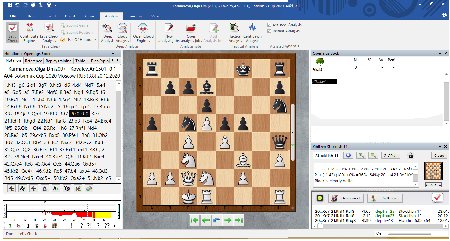A short while back I took a look at ChessBase 16's Centipawn Analysis function and while I found it interesting, it doesn't seem to me that it has much practical use. In any case, ChessBase 16 has been on my laptop for a while now, but mostly it just sits there unused.
However, because the weather around here has been so wretched the past week or so, I have been tinkering with the program trying to make myself like it. One of the reasons I don't use it, if I am being honest, is that it is a lot more complicated than the old Fritz 12 I have been using for years. Also, because the improvement ship sailed a long time ago and I don't play OTB any more nor do I take correspondence play seriously (thanks to engines!!), I simply don't need a ton of features. So, what's it got?
For many players cost will be a factor because depending on what package you get the price range is roughly from $135 to $525! There's a lot of stuff that's new: folding game notation, novelty mining, live databases of tournaments, theory and tactics, opening comments and notifications, the aforementioned Centipawn Analysis, PGN downloads, the ability to organize your opening repertoire and game tags. That's a lot of new features!
I got the download starter package and when it came to installation and launch it was quick and there were absolutely no snags. I read that ChessBase did not change their interface, so anyone that has used it before will see what they used to.
One thing that had me slightly confused for a minute was something called Variation Folding. When it's on there are green and yellow minus/plus signs and the variations are hidden; this makes the game score cleaner. Just click on it and the variations magically appear. If you turn it off all variations are expanded which is what I am used to seeing in other programs.
Opening Surveys is one of the new features. You can use it to cross-reference games and select the ones you are interested in. What it does is generate a survey based on the order of the opening moves. This could be quite handy for players for whom opening repertoires are important.
Another opening feature that could be handy is something called Novelty Mining which is a way to find novelties using an engine. When you click on it you'll get a list of options that let you configure how the engine will search and evaluate new moves. This looks to me to be no different than simply selecting a position and letting the engine analyze it.
One of the new feature is the Live Databases. In the database menu you click on the icon and you see several databases of major events from all over the world. Looking for Tactical Games? click on the Tactics icon and get a list of games that involved interesting tactical displays. Interested in Opening Novelties? There's an icon for that, too, but I am not sure exactly how you search for specific moves although there might be a way to do it.
Game Tags is another new feature that allows you to tag your games with information that will help you search them at a later date. For example, you can tag a game with something like "opening blunder" or "lost a won game" or some such.
All in all ChessBase 16 has some features that serious players looking to improve their game can use and it's relatively easy to use once you become familiar with its many features. However, if you are not particularly interested in trying to improve your chess and just want to do things like organize databases and play over and analyze games then the product is probably overkill.



No comments:
Post a Comment